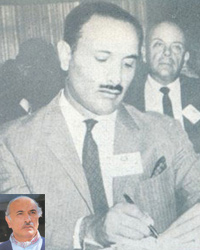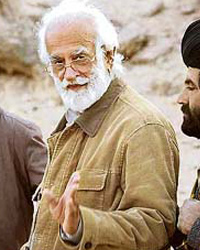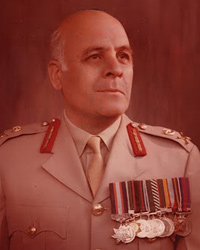
West Pakistani friends
Last updated: 5 October 2017 From the section 1971 Muktijuddho
Air Marshal Asghar Khan, Council Muslim League leader Mian Mumtaz Daultana, NAP leader Khan Abdul Wali Khan, Nawab Akbar Bugti, and Malik Ghulam Jilani were among those who made it clear that unless power was transferred to Sheikh Mujibur Rahman, Pakistan would be in danger of coming apart.
Power should immediately be transferred to Mujib. Our hearts are crying with tears of blood for the people in East Pakistan.
Former Air Force Commander Air-Marshal Asghar Khan on 6 March 1971
If for our shortsightedness Bangladesh breaks away, West Pakistan would not be able to last for even five years.
On 2 March 1971, a day after Yahya postponed the assembly session, Air Marshall Malik Nur Khan, former Commander-in-Chief of Pakistan Air Force (1965-69) who became Deputy Martial Law Adminstrator and West Pakistan Governor (1969-70) when General Yahya became President, warned Yahya that the postponement would have "irreparable damage" and that he was "wrongly advised".
The President must call the session again in March, otherwise irreparable damage will be done. The President is being wrongly advised by a highly placed person. If change of power does not take place. West Pakistan will always have army rule.
On 12 March 1971 Major-General Sher Ali Khan, former information minister in Yahya's cabinet, cabled the President urging him to do nothing which would leave him with "the blame for putting an end to this Islamic republic" http://www.molwa.gov.bd/admin/pdf/1341474863.pdf.
On 14 March 1971 various West Pakistan leaders expressed their support for Sheikh Mujib and demanded transfer of power to him http://www.banglapedia.org/HT/N_0219.htm. These leaders included former governor Azam Khan, Jamiatul Ulama-e-Islam leader Mufti Mahmud, Sardar Shawkat Hayat Khan, Maulana Shah Ahmad Nurani, Jamal Mohammad Koreja of Convention Muslim League, Abdul Gafoor of Jamaat-e-Islami, and Sardar Moula Bakhsh Sumro.
 Asghar Khan (Born 1921) Pakistani veteran aviation historian, peace activist, and retired military figure — a three star rank air marshal. Served as first native Chief of Air Staff of the Pakistan Air Force (1957 - 1965). Resigned prior to the start of Indo-Pakistani War of 1965. Drafted into Royal Air Force in 1940, seeing actions in Burma Campaign. Graduated from RAF Staff College at Bracknell, and completed post-graduate from world-renowned Royal College of Defence Studies (then called Imperial Defence College). First commandant of Pakistan Air Force Academy (1947) and also first to head the Directorate-General for Air Operations (1950). Became the youngest to-date and the first native Air Force Commander-in-Chief of Pakistan Air Force (1957). Founded secular party Tehrik-e-Istiqlal (1970) which merged with cricketer-turned politician Imran Khan's Pakistan Tehreek-e-Insaf in January 2012. Designated a prisoner of conscience by Amnesty International, and conferred with the Gold Medal by the Human Rights Commission, and Jinnah Award Award by the Jinnah Society for the cause of democracy.
Asghar Khan (Born 1921) Pakistani veteran aviation historian, peace activist, and retired military figure — a three star rank air marshal. Served as first native Chief of Air Staff of the Pakistan Air Force (1957 - 1965). Resigned prior to the start of Indo-Pakistani War of 1965. Drafted into Royal Air Force in 1940, seeing actions in Burma Campaign. Graduated from RAF Staff College at Bracknell, and completed post-graduate from world-renowned Royal College of Defence Studies (then called Imperial Defence College). First commandant of Pakistan Air Force Academy (1947) and also first to head the Directorate-General for Air Operations (1950). Became the youngest to-date and the first native Air Force Commander-in-Chief of Pakistan Air Force (1957). Founded secular party Tehrik-e-Istiqlal (1970) which merged with cricketer-turned politician Imran Khan's Pakistan Tehreek-e-Insaf in January 2012. Designated a prisoner of conscience by Amnesty International, and conferred with the Gold Medal by the Human Rights Commission, and Jinnah Award Award by the Jinnah Society for the cause of democracy. Nawab Akbar Bugti (1927 - 2006) Tumandar (head) of the Tuman Bugti (a political alliance not tribe) of Baloch. Served as Minister of State for Interior (1958) and Governor of Balochistan Province in Pakistan (1973). Received Higher Education from Oxford University. Arrested and convicted by a Military Tribunal in 1960 and subsequently disqualified from holding public office. As a result of his legal battles, he did not contest the 1970 general elections. Instead, he campaigned on behalf of his younger brother, Sardar Ahmed Nawaz Bugti, a candidate of the National Awami Party. Went underground in 2005, but killed in cave in Kohlu, about 150 miles east of Quetta on 26 August 2006 by government missile attacks. Killing lead to widespread unrest in the area. Famously quoted "It is better to die quickly in the mountain than slowly in bed".
Nawab Akbar Bugti (1927 - 2006) Tumandar (head) of the Tuman Bugti (a political alliance not tribe) of Baloch. Served as Minister of State for Interior (1958) and Governor of Balochistan Province in Pakistan (1973). Received Higher Education from Oxford University. Arrested and convicted by a Military Tribunal in 1960 and subsequently disqualified from holding public office. As a result of his legal battles, he did not contest the 1970 general elections. Instead, he campaigned on behalf of his younger brother, Sardar Ahmed Nawaz Bugti, a candidate of the National Awami Party. Went underground in 2005, but killed in cave in Kohlu, about 150 miles east of Quetta on 26 August 2006 by government missile attacks. Killing lead to widespread unrest in the area. Famously quoted "It is better to die quickly in the mountain than slowly in bed". Malik Ghulam Jilani ()
Malik Ghulam Jilani ()  Malik Nur Khan ()
Malik Nur Khan ()
